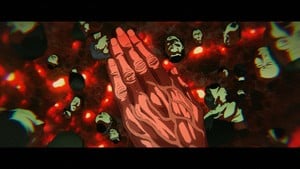The Summer Hikaru Died
Episode 10
by Steve Jones,
How would you rate episode 10 of
The Summer Hikaru Died ?
Community score: 4.0

This episode opens with a wallop. I fear sometimes I neglect to give an adaptation its due when it is as consistently inventive and visceral as The Summer Hikaru Died, so I want to start with praise for how well it pulls us into Yoshiki's point of view. He may have one foot on the other side, but that doesn't mean he's mentally prepared to hold his best friend's severed head in his lap. The result is a cacophony and color, amplified by Yoshiki's hysteria and Tanaka's menacing, pitch-shifted laughter. It doesn't feel nightmarish as much as it feels like an authentic nightmare.
This is also an appropriate opening for a chapter that mostly focuses on the horror framing by filling in various gaps in our knowledge. Tanaka, for instance, is uncharacteristically chatty after his encounter with Hikaru. You could even call him giddy. He lets loose some important details, like his blindness, and his implicit confirmation that the “company” he works for isn't of our world. Kurebayashi also mentions a company, so they're likely the same group that dealt with her husband. Tanaka, however, has his own secret plans for Hikaru. If he merely wanted to exorcise him, he probably could have done it then due to Hikaru's weakened state. Somehow, though, I doubt his true intentions are any more benevolent.
Many of this episode's other expository moments deal with one of my favorite components of folk horror as a genre: its relationship to history. To yet again reference my experience with Higurashi, I loved how my understanding of elements like Watanagashi and Oyashiro-sama deepened and evolved across the visual novel's interwoven chapters. Here, similarly, we learn about Nonuki-sama's possible origin as an abortion drug derived from cinnabar. While that might seem like a stretch, there are many cases of verifiable historical facts becoming fodder for myths and legends that supersede reality in the cultural consciousness, so it definitely could have happened here. People were especially prone to inventing gods, demons, and other creatures when times were tough and their understanding of the natural world was lacking. And if enough people believe in something, particularly in small and isolated groups, that collective mental power far exceeds the reach of reality.
The information from Maki's brother also brings real-life religion into the mix. The mountain villages became regarded as cursed centuries ago, but this made them ideal sanctuaries for Christians who were being persecuted in Japan at the time. Kubitachi, however, remained “pagan” due to the village's closer connection to the source, and possibly due to the Indo family's active role in the rituals around Nonuki-sama. This, too, feels believable, because Christians wouldn't care about other gods besides their own, and I'm interested to see if the story does more with this angle. I can't help but find the history of Christianity in Japan to be fascinating.
Meanwhile, the additional details of the blood sacrifices to Nonuki-sama are wickedly grisly. Burying dismembered body parts in an area named after the same body part, which also happens to geographically resemble a stick person, is so macabre that it's almost funny. The English equivalent would be finding a pile of severed feet in a town called Footsville that looks like a foot on a map. To be clear, I love this. While the queer themes are what The Summer Hikaru Died does best, I can't help but have a soft spot for horror with ambitiously weird ideas. It also totally went over my head (haha) that all of those ghosts had something wrong with their necks and noggins. That's a neat reveal hiding in plain sight.
The episode's best visual payoff, however, comes when Yoshiki and Hikaru open the Indo's shrine. While there's nothing intrinsically untoward about a cramped room lined with wooden carvings of people's faces, the image is intuitively creepy, and the context only makes it worse. It's a monument to how much violence people are willing to inflict and put up with to sustain their way of life. Moreover, The Summer Hikaru Died quickly prompts us to question what it was all for, as Hikaru muses that he can't recall needing severed heads for anything.
There's no doubt that Hikaru needs people, though. In the post-credits scene, he seems to still be dazed by his recent decapitation, and like a moth drawn to flame, he finds himself shuffling over to Yoshiki's place. Hikaru's insides are cold, so he seeks the radiance that he can perceive swirling inside of Yoshiki. This might be what Nonuki-sama was doing with those skulls—absorbing them to compensate for his emptiness. If so, whenever Hikaru's instincts take over, that's what he tries to do. In the hospital room, we see Yoshiki nearly fall into Hikaru again before Kurebayashi snaps him out of it, waking up Hikaru in turn. But violence and coercion aren't the only ways to solve loneliness. They aren't even the best ways. Therefore, Yoshiki may need to help Hikaru realize that there are kinder and gentler methods for relieving the gaps we all contain within ourselves.
Rating:
The Summer Hikaru Died is currently streaming on Netflix.
Disclosure: Kadokawa World Entertainment (KWE), a wholly owned subsidiary of Kadokawa Corporation, is the majority owner of Anime News Network, LLC. One or more of the companies mentioned in this article are part of the Kadokawa Group of Companies.
discuss this in the forum (23 posts) |
back to The Summer Hikaru Died
Episode Review homepage / archives